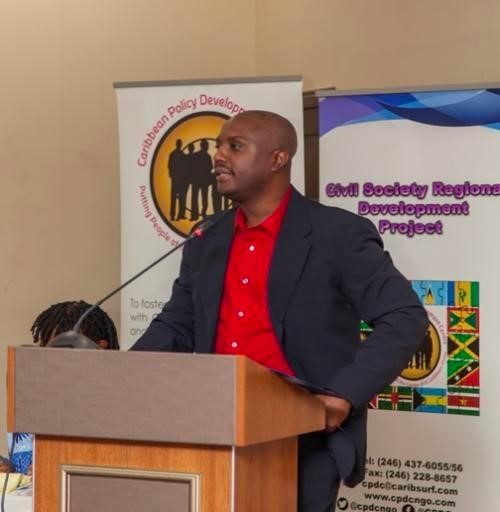
Officer-in-Charge at the Caribbean Policy Development Centre (CPDC), Richard Jones, is urging Caribbean governments to re-imagine the current development model being pursued in order to achieve sustainable social and economic development across the region.
According to Mr Jones, the current structure of Caribbean economies was never designed to facilitate sustainable social and economic development. “Our dependence on borrowing from our former colonial masters and the Western financial system for our economic stability each year is a glaring example of the unjust and unequal international financial system that we confront,” he explained.
“We are talking about more than just debt management. Our call is for the governments of the wider Caribbean to join us in re-imagining the model of development we have utilised since independence”, Mr Jones said in a recent address to a group of civil society representatives in Grenada.
While acknowledging that the region is at a critical juncture in charting the development pathway necessary for sustainable growth and development, Mr Jones argued that many of the historical modalities that have guided Caribbean societies and economies over the past few decades are being tested, contradicted, and in some instances evolving.
“How our region prepares itself and our people to renegotiate our place within the systemically dynamic and emerging global and hemispheric space will be critical to our long-term sustainable development,” he stated.
Mr. Jones shared that many civil society representatives are also of the view that regional leaders need to re-examine political visioning and policymaking in the region. “CPDC shares some of these views and perspectives as we believe that countries in the region, such as Grenada, must move beyond traditional economic debt management planning to include and emphasise sustainable economic development for all our people. This would require bold steps to challenge the unequal international financial architecture and also adopt local solutions to improve our health and economic well-being”, he indicated.
“As stakeholders in national and regional development, we must all focus our energies on collectively working towards a sustainable development model for the Caribbean. One pillar for such a model can be built on a foundation that reduces our dependence on loans from western multilateral and private creditors by strategically increasing the use of local resources to reduce the demand for external borrowing.”
The CPDC’s Officer In Charge further noted that this could be achieved through greater utilisation of agri-products for a notable part of our food consumption, widespread use of alternative energy to reduce the significant national oil import bill, and the implementation of practical and effective accountability and transparency laws to minimise potential adverse impacts of foreign debt.
“Complimentary to these suggestions is the need for our region to escalate the pressure on our former colonial masters for a reparatory approach to finance a new development model for the Caribbean,” Mr Jones added. He also noted that although CARICOM has commenced this process, greater advocacy demands support from governments across the region as well as from civil society to push the agenda. These funds, he maintained, can then be made available to create an innovative, robust economy and society driven primarily by non-state actors.
“We need to acknowledge that we are borrowing today for future generations to repay and that is very critical,” CPDC’s Officer-in-Charge cautioned the participants.
CPDC is an umbrella body for Caribbean non-governmental organisations. The CPDC has been hosting a series of national civil society consultations on sovereign debt with a view to building awareness and developing national positions on the looming crisis in various Caribbean countries. This initiative forms part of a regional sovereign debt campaign being implemented with the support of Debt Justice UK, the Open Society Foundation (OSF) and Funders Organised for Rights in the Global Economy (FORGE). To date, consultations have been held in Antigua and Barbuda, Barbados, Suriname, The Bahamas, and Trinidad and Tobago.

To re-imagine demands creative thought and action.
Unfortunately, all things creative are on the Ministry of Education’s backburner.
“One pillar for such a model can be built on a foundation that reduces our dependence on loans from western multilateral and private creditors by strategically increasing the use of local resources to reduce the demand for external borrowing.”
“Complimentary to these suggestions is the need for our region to escalate the pressure on our former colonial masters for a reparatory approach to finance a new development model for the Caribbean”
What youre saying here is we need to reduce our dependency on external borrowing…. but lets wait on the Money that we’ve been waiting on for the past 200 years…..?????
Sure – a new, sustainable development model is needed, but it needs to come from us!
We need to reimagine our agriculture/ export product, enhance our tourism product, introduce AI and coding into our schools curriculum to position the region as a silicon valley 2.0 to be competitive in the future…..
Stop depend on people to pull us out of our lack of trying…
I can tell you read the article but didn’t understand a thing, what have you been smoking?